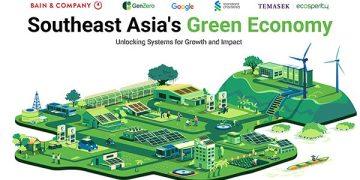Introduction
Financial markets and economies around the world are intricately connected, and daily news reports offer valuable insights into the shifting dynamics of the global economy. These trends can arise from a variety of factors, including macroeconomic data, geopolitical events, technological advances, and changes in consumer behavior. Understanding these trends is essential for investors, policymakers, and business leaders, as they guide decision-making processes in uncertain environments. In this article, we will explore the global economic trends revealed by today’s headline news, providing context and analysis on their potential impact on the world economy.
Section 1: Rising Inflationary Pressures Across Major Economies
One of the most dominant themes in today’s financial news is the ongoing challenge of rising inflation. Many countries are experiencing persistent inflationary pressures, which are driven by supply chain disruptions, rising commodity prices, and higher demand in certain sectors.
Key Drivers of Rising Inflation:
- Commodity Price Surge: Increases in the prices of raw materials, such as energy (oil and gas), agricultural products, and metals, have contributed significantly to inflation in many economies.
- Supply Chain Bottlenecks: The lingering effects of the COVID-19 pandemic and logistical disruptions continue to cause delays in the production and delivery of goods, pushing up prices.
- Labor Shortages: In several economies, especially in sectors like hospitality, construction, and manufacturing, labor shortages have forced businesses to raise wages, which are often passed on to consumers through higher prices.
Impact on Global Economies:
- In the U.S. and Europe, inflation has reached levels not seen in decades, leading central banks to reassess their monetary policies. As central banks like the U.S. Federal Reserve and the European Central Bank begin tightening interest rates to curb inflation, this can have widespread effects on investment strategies and borrowing costs.
- Emerging markets are also feeling the strain of rising prices, as higher inflation erodes purchasing power and creates challenges for central banks trying to balance inflation control with economic growth.
What It Means for Investors:
- Investors are likely to seek protection from inflation by turning to assets like commodities, real estate, and inflation-protected securities. Equities in sectors such as energy and materials may perform well, while growth stocks, particularly in sectors like technology, may face headwinds due to rising interest rates.
- With inflation eroding consumer purchasing power, consumer discretionary stocks may also underperform, especially those reliant on non-essential spending.
Section 2: Central Bank Policy Shifts and the Rise in Interest Rates
Central banks around the world are making headlines with their monetary policy decisions, particularly regarding interest rate hikes. The shift from ultra-low interest rates, which were implemented during the pandemic to support economic recovery, to a more hawkish stance is a key trend in the global economy.
Central Bank Actions:
- U.S. Federal Reserve: The Fed has been signaling a series of interest rate hikes to tackle the highest inflation rates in decades. Today’s news focuses on the Fed’s commitment to raising rates, which has already begun, and the potential for more hikes in the coming months.
- European Central Bank: While the ECB has been slower to raise rates than the Fed, there are indications that it may follow suit to counter inflationary pressures in the Eurozone. The recent data shows that inflation in the Eurozone remains stubbornly high, prompting discussions about tightening policy.
- Bank of England and Other Global Central Banks: Other central banks, such as the Bank of England and the Reserve Bank of Australia, have already started tightening monetary policy, following similar concerns over inflation and economic overheating.
Impact on Global Economies:
- Slower Economic Growth: Rising interest rates typically slow down economic growth as borrowing becomes more expensive. This could affect consumer spending, business investments, and housing markets globally. Sectors like real estate, construction, and technology may feel the pinch, while interest-sensitive industries such as utilities and financials may benefit from higher rates.
- Strengthened Currency: As interest rates rise in major economies like the U.S., the U.S. dollar has strengthened, which could further strain trade balances and increase the cost of imports for many countries.
What It Means for Investors:
- As central banks tighten monetary policy, investors will need to adjust their portfolios accordingly. Sectors that benefit from lower rates, such as technology and high-growth companies, may experience slower growth, while financial stocks could see a positive impact from rising interest rates.
- Currency fluctuations may also affect multinational corporations and investors with global exposure. A stronger U.S. dollar, for example, may hurt the earnings of U.S.-based companies with significant international operations.

Section 3: Ongoing Geopolitical Tensions and Their Economic Impact
Geopolitical events, particularly those involving major powers, have an outsized effect on the global economy. Today’s headlines highlight the growing tensions between the U.S. and China, the war in Ukraine, and the potential ripple effects on global trade and supply chains.
Key Geopolitical Events:
- U.S.-China Relations: Trade tensions between the U.S. and China remain high, with both countries imposing tariffs on each other’s goods. Additionally, there are concerns about the potential for conflict over Taiwan, which could escalate into a broader geopolitical crisis.
- War in Ukraine: The ongoing war between Russia and Ukraine continues to disrupt energy markets, particularly in Europe, which relies on Russian gas and oil. The conflict has exacerbated inflationary pressures, especially in energy prices, and has led to disruptions in global food supplies.
- Sanctions and Trade Disruptions: In response to Russia’s actions in Ukraine, many countries have imposed sanctions that affect global trade. These sanctions are particularly affecting European countries, which are heavily reliant on energy imports from Russia.
Impact on Global Economies:
- Energy Crisis: Europe is experiencing an energy crisis, with soaring gas prices and the potential for shortages, especially as winter approaches. This is putting pressure on governments to find alternative energy sources, while businesses face higher operating costs.
- Disrupted Supply Chains: The geopolitical tension in Eastern Europe and ongoing trade disputes are further disrupting global supply chains, particularly in the technology sector. The shortage of key components, such as semiconductors, continues to create bottlenecks in production across various industries.
- Inflationary Pressures: The war in Ukraine and sanctions on Russia are also driving up global food prices, particularly in Europe and parts of Asia, as Ukraine is a major producer of grain and wheat. These price increases add to the overall inflationary environment.
What It Means for Investors:
- Energy and Defense Sectors: Investors may seek refuge in sectors such as energy, particularly oil and gas companies, which benefit from rising commodity prices. The defense sector is also seeing increased demand due to the geopolitical instability, as countries ramp up military spending.
- Safe-Haven Assets: In times of geopolitical uncertainty, assets like gold, U.S. Treasury bonds, and the Swiss franc tend to perform well, as investors flock to perceived safe havens.
- Global Diversification: The geopolitical risks highlighted in today’s news may encourage investors to diversify their portfolios across regions and asset classes to mitigate the impact of these risks.
Section 4: Technological Innovation and Sustainability Focus
Amidst global economic challenges, technological innovation continues to be a key driver of growth in the global economy. The transition to a greener, more sustainable future is gaining momentum, as governments, corporations, and consumers focus on clean energy and environmental sustainability.
Key Technological Trends:
- Green Technologies: As the world faces the pressures of climate change, investments in clean energy, electric vehicles, and sustainable technologies are on the rise. Major economies are ramping up investments in solar, wind, and battery storage technologies.
- Digital Transformation: The shift toward digitalization continues, with industries such as healthcare, finance, and education embracing technological solutions. Companies are investing in artificial intelligence (AI), automation, and cloud computing to drive efficiency and innovation.
Impact on Global Economies:
- Job Creation and Skill Development: The green economy and technological advancements are creating new industries and job opportunities. However, this also requires a shift in skill development and education to prepare the workforce for emerging roles in renewable energy and technology.
- Investment in Infrastructure: Governments and private companies are investing heavily in sustainable infrastructure, from renewable energy projects to electric vehicle charging networks, which will drive long-term growth and development.
What It Means for Investors:
- Renewable Energy and Tech Stocks: Investors may look to allocate more capital to companies involved in renewable energy production, energy storage, and electric vehicles. Additionally, technology companies focusing on AI, automation, and cloud computing are expected to see continued growth.
- Sustainability and ESG Investing: Environmental, Social, and Governance (ESG) investing is becoming increasingly popular, with many institutional investors focusing on companies with strong sustainability practices. ESG-focused funds and stocks are seeing strong demand.
Conclusion
Today’s headline news reveals a complex and dynamic global economic landscape. Key trends such as rising inflation, central bank policy shifts, geopolitical tensions, and technological advancements are shaping the world economy. Investors, businesses, and policymakers will need to navigate these trends carefully, adjusting their strategies to account for changing economic conditions. By staying informed and analyzing the impact of these trends, individuals and institutions can better position themselves to thrive in an increasingly interconnected and volatile global economy.



































